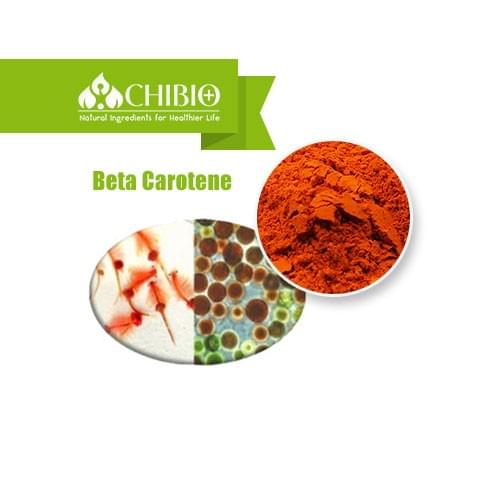
Beta Carotene

1.What is Beta-Carotene?
Beta-carotene (C40H56) is one of the carotenoids and an orange-soluble fat-soluble compound. It is the most common and stable natural pigment in nature. Many natural foods such as green vegetables, sweet potatoes, carrots, spinach, papaya, mango, etc., are rich in beta-carotene. Beta-carotene is an antioxidant that has detoxification effect and is an indispensable nutrient for maintaining human health. It has significant functions in anti-cancer, prevention of cardiovascular diseases, cataracts and anti-oxidation, and thus prevents aging and aging. A variety of degenerative diseases.
Beta-carotene can be converted to vitamin A after entering the body. Excessive intake of vitamin A in the body can cause poisoning, and the body converts beta-carotene to vitamin A only when needed. This feature makes β-carotene a safe source of vitamin A, and there is no cumulative poisoning of vitamin A due to overfeeding. In addition, β-carotene also has a good effect in promoting the growth and growth of animals.
Beta-carotene, a name derived from Latin carrots, is a member of the family of natural chemicals such as carotene or carotenoids. It is abundant in plants, giving fruits and vegetables a full yellow and orange color. Beta-carotene is also used as a coloring agent for foods such as margarine.

2. Five Types of Beta-Carotene:
Common beta-carotene products are: crystalline, 30% oil suspension, 10% water soluble dry powder, 1% water soluble suspension and 1.5% water soluble powder.
Since pure products are generally easily oxidized, they are used most with 30% oil suspension. In addition, water-soluble products are easy to use and are therefore used in beverages.
Product Name | Specification | Character of product |
Beta carotene powder | 1%(Food Grade CWS) | Yellow to orange powder with special smell |
10%(Food Grade CWS) | ||
Beta carotene particles | 10%(Food Grade e DC) | Orange to reddish brown with special smell of spherical particles |
10%(Feed Grade) | Orange to reddish brown with special smell of spherical particles | |
20%(Feed Grade) | ||
Beta carotene emulsion | 2%(Food Grade CWS) | Maroon thickens liquid, can be evenly spread and dissolved in water, good dispersion. |
Beta carotene suspension | 30%(Food Grade) | Suspended in the micro crystal in vegetable oil, dissolved state is shown after heating, brick red. |
Beta carotene | ≥96%(Single Product) | Purple or red crystal powder, odourless, tasteless |
3.Specification of Beta-Carotene:
Name | Salina extract |
Botanical source | Dunaliella salina |
Specification | β-carotine Powder 1% ,8% ,10%, 20% ;10:1,20:1; Oil:30% |
Appearance | Orange Red Powder, Reddish-brown liquid |
Test Method | HPLC |
Odor | Characteristic |
Part Used | Whole grass |
Ash Content | ≤5% |
Extract solvent | Ethanol or water |
Drying Method | Spray Dying |
Particle Size | NLT100%Through 80 mesh |
Loss on Drying | ≤ 5.0% |
Bulk Density | 35-55g/100ml |
Arsenic | ≤2ppm |
Lead | ≤2ppm |
Total Plate Count | ≤1000cfu/g |
Total Yeast & Mold | ≤100cfu/g |
4.Benefits & Applications of Beta-Carotene:

As a kind of edible oil-soluble pigment, Beta-carotene can be covered by all the colors from red to yellow due to the difference in concentration. Therefore, it is quite warmly welcomed by the food industry. It is very suitable for the development of oily products and protein products, such as margarine, capsules, fish paste products, vegetarian products, and the color of instant noodles. The microcapsule-treated Beta-carotene can be converted into a water-soluble pigment, and almost all foods can be applied. In addition, Beta-carotene has important uses in feed, cosmetics and the like.
- 1: Mainly used in food, health care products and medicines.
- 2: Eat orange pigment; nutritional fortifier. Mainly used in margarine, noodles, cakes, beverages and health foods.
- 3: As a nutritional supplement and food coloring agent.
- 4: As a feed vitamin supplement and colorant.
- 5: Nutritional supplements and pigments.
It is widely used as a yellow pigment instead of an oil-soluble tar pigment, such as cream, cheese, mayonnaise, etc., which are originally contained in carotene, and is widely used in other edible fats, margarines, shortenings, pastries, breads, and the like. When used in oily foods, it is often dissolved in edible oils or suspensions such as cottonseed oil (content 30%). After dilution, even if used, it can prevent the oxidation of β-carotene. An antioxidant such as α-tocopherol, stearyl ascorbate or BHA is generally added. It is used in a small amount of pigment, such as 1.37 mg/kg for margarine. It can be used in combination with vitamin C in juice to improve stability. - 6: Drugs. Feed and food additives. Nutritional supplements and pigments.

Beta-carotene is a precursor of VA in nature and can be converted to VA in humans. Due to the lack of VA, it will cause night blindness. Ingestion will cause poisoning. In addition, only β-carotene in nature will be converted into VA when it is needed by the human body. It is the safest way to supplement vitamin A.

The ratio of beta-carotene converted to VA in the human body is controlled by the human VA state. When the amount of VA in the body is sufficient to meet the metabolic needs of the body, β-carotene will be stored in the body, and when the VA in the body is insufficient, it will be released to the body for metabolism, and will be converted into VA in time. VA maintains eye and skin health and improves night blindness and rough skin.




